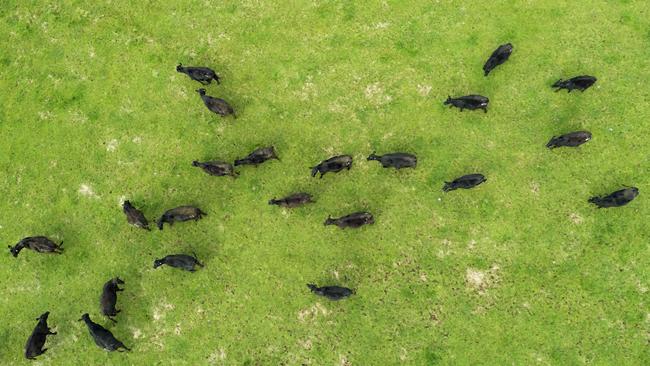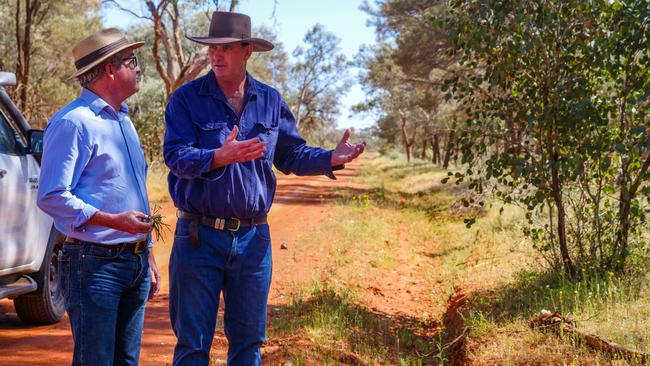Carbon Market Institute demands government’s Climate Active be updated in order to hit net zero
Frustrations are mounting over the federal government’s failure to modernise a carbon emissions scheme as new data shows a less than 2 per cent fall in annual emissions from our largest polluters.

Corporate Australia is frustrated the federal government’s net zero emissions program has not modernised and evolved to head off greenwashing claims, the Carbon Market Institute says, as the nation’s biggest polluters delivered a modest drop in annual emissions.
With new Safeguard Mechanism data on Tuesday showing a less than 2 per cent fall in annual emissions from Australia’s largest polluters, pressure is mounting on business to lift its climate ambitions if Labor is to meet its goal of cutting emissions by 43 per cent by 2030.
The Australian revealed this week that the $230bn industry super fund-backed IFM Investors has quit the federal government’s net zero carbon emissions scheme, joining a growing number of corporates turning their back on the offset program as the sector battles greenwashing accusations.
The Carbon Market Institute – whose members include AGL Energy, BHP and Coles – said the Climate Active scheme needed to be modernised.
“Business users of Australia’s unique sovereign-backed Climate Active scheme have been understandably frustrated by government delays in reforming the program which is stuck in ‘Carbon Market 1.0’ framing of carbon neutrality that is exposed to greenwashing claims,” Carbon Market Institute chief executive John Connor told The Australian.
“Best practice guidance on corporate net zero is evolving from carbon neutrality to ‘Carbon Market 2.0’ net zero alignment in a global effort to ensure the substance and speed of our collective efforts. This shift demands a focus on both deep emissions reductions and complementary investments for emissions that cannot be immediately reduced, including through carbon markets.”
More than 100 companies had already left Climate Active in the last 18 months. The program offers certificates to those engaged in carbon abatement, and allows users to purchase carbon credits to offset their emissions with the aim of hitting net-zero targets.
New data released by the Clean Energy Regulator showed emissions fell by 1.9 per cent to 136 million tonnes of carbon dioxide equivalent for the 2023-24 year ending June 30.
T

he CMI said the annual cut represented a good “training wheels” result given it marked the first data since reforms to the safeguard scheme were implemented in 2023.
“While there are a range of factors likely in play in the first year’s data, this is a good start. It is important to remember that this is a ‘training wheels’ year for facilities, with accelerating investment in reductions required in years ahead,” Mr Connor said in a statement.
Labor’s safeguard mechanism is projected to lower net emissions from the 215 facilities, responsible for 28 per cent of Australia’s carbon emissions from 143 million tonnes in 2022-23 to “no more than 100 million tonnes by 2030”.
The current safeguard mechanism applies to companies producing more than 100,000 tonnes of carbon emissions annually.
The policy includes a 4.9 per cent decline rate each year to 2030 to encourage big polluters to invest to reduce their operating carbon emissions – or buy offsetting carbon credits where they cannot.
The latest corporate exits from the Climate Active scheme may further fuel expectations that the next federal government could move to scrap the regime altogether.
A decision about the future direction of the Climate Active program is yet to be made, according to the Department of Climate Change, Energy, the Environment and Water.
The CMI said reforms rather than junking the program altogether was the best approach.
“The way forward to address greenwashing concerns and use Climate Active to its full potential is to reform not repeal the scheme and to double down on Australian carbon credit integrity and method reforms,” Mr Connor said.
In February, Assistant Climate Change and Energy Minister Josh Wilson held a series of meetings with organisations such as the Carbon Market Institute, assuring the industry that there were no plans to dismantle Climate Active.
A government spokesman said at the time the Coalition had established Climate Active, and that Labor was now trying to fix the issues in the scheme.






To join the conversation, please log in. Don't have an account? Register
Join the conversation, you are commenting as Logout